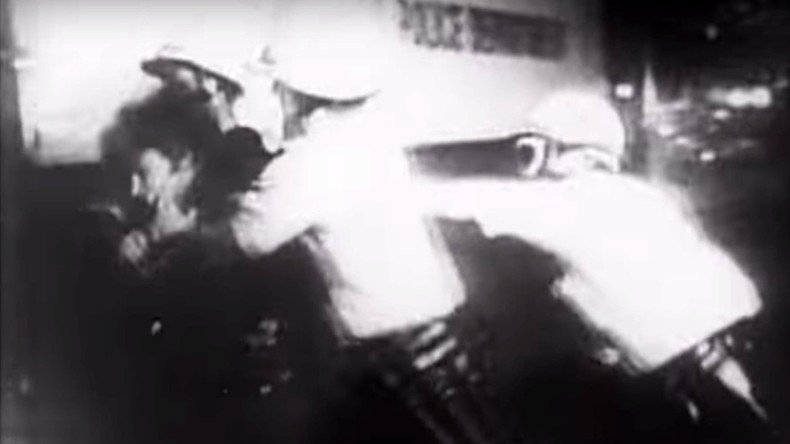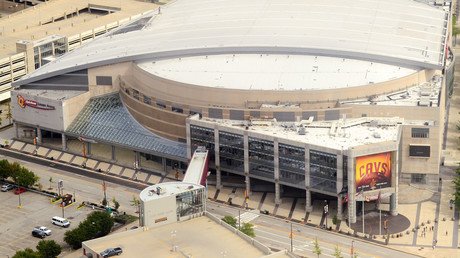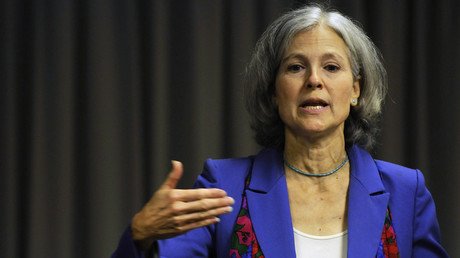RNC 2016: How will it stack up against crazy conventions of America's past?

Donald Trump will officially claim the GOP presidential nomination at next week's Republican National Convention in Cleveland, Ohio, but likely not without some turmoil surrounding the Quicken Loans Arena. How will 2016 stack up against conventions past?
With gun-toting supporters and protesters outside the arena, and the coronation of the audacious, non-establishment Trump inside, the 2016 RNC is poised to be a turbulent display of a deeply divided, anxious America. Yet Republican and Democratic national conventions of the past haven't exactly been calm, agreeable affairs.
1964 RNC
Trump's run for president has garnered some comparisons to the 1964 candidacy of Barry Goldwater, a Republican US Senator from Arizona. Goldwater was a conservative opponent of the Civil Rights Act and the preferred candidate of racist groups like the Ku Klux Klan. Led by New York Governor Nelson Rockefeller, more moderate Republicans tried desperately to block Goldwater's candidacy, but to no avail.
Called the "ugliest Republican convention since 1912" by historian Rick Perlstein, the 1964 RNC in San Francisco included throwing reporters off the convention floor, a delegate vote against the recently passed Civil Rights Act of 1964, and denunciations of the "few secret kingmakers in New York."
The convention was "horrible,"said one member of the New York Young Republicans. "I felt like I was in Nazi Germany."
Goldwater was handily defeated by the incumbent, US President Lyndon Johnson, but the division within the Republican Party in 1964 lingered following the "Woodstock of the Right," as Goldwater biographer Robert Alan Goldberg termed the raucous convention.
1968 DNC
While the 2016 RNC may have greater potential for violence than any other convention in recent past — thanks to Ohio's open-carry gun laws — the bar is set high thanks to the 1968 Democratic National Convention in Chicago. Tensions in American politics had reached an epic level amid the Vietnam War, the ongoing struggle for desegregation, and the recent assassinations of civil rights leader Martin Luther King Jr. and Democratic presidential nomination frontrunner Robert Kennedy.
Vice President Hubert Humphrey, a moderate, eventually won the party's nomination, but only thanks to the Democrats' system of awarding delegates based on the choice of party elites — a process similar to the superdelegates of today.
Outside the convention hall, anti-war protests met fierce police and National Guard violence, including the use of tear gas. Mayor Richard Daley said "no thousands will come to our city and take over our streets, our city, our convention."
In response to indiscriminate police violence, demonstrators chanted, "the whole world is watching."
1924 DNC
The 1924 Democratic National Convention in Manhattan took 103 ballots over 16 days for delegates to agree on a compromise candidate, John W. Davis, over the conservative former Treasury Secretary William G. McAdoo and progressive New York Governor Al Smith.
Dubbed the "wildest convention in US history" by Politico Magazine, the 1924 DNC turned into a brokered convention, with McAdoo and Smith unable to reach the delegate threshold needed to be the nominee. Fistfights and shouting matches marked the more than two-week convention. Ten days into the convention, 20,000 members of the KKK gathered across the Hudson River from Manhattan to support McAdoo and burn crosses in their opposition to the candidacy of Smith, a Catholic, according to The 103rd Ballot, a 1976 book by Robert Murray.
2012 RNC
Mitt Romney's nomination as the Republican Party's choice to face incumbent president Barack Obama was largely uncontroversial and calm, as are most party conventions in recent decades. But it was actor Clint Eastwood's bizarre conversation to an empty chair — supposedly occupied by an imaginary Obama — that will be remembered about the 2012 Republican National Convention in Tampa.
“So I’ve got Mr. Obama sitting here and I just was going to ask him a couple of questions. But you know, I remember 3½ years ago when Mr. Obama won the election and, no, I wasn’t a big supporter,” Eastwood said, speaking to an empty stool.
The actor's mock question-and-answer session was described as a "rambling performance" and "painfully hysterical," as the famed actor-director took out his frustrations on fake Obama.
This seat's taken. http://t.co/tvHZDcfw, pic.twitter.com/jgGZTb02
— Barack Obama (@BarackObama) August 31, 2012
Eastwood, 82 years old at the time, was also criticized for choosing to represent the first black US president as invisible, drawing comparisons with the novel Invisible Man, Ralph Ellison's seminal work on the black experience in the segregated US South.
RNC 2016?
This year's RNC has proven controversial even before its official start on Monday, July 18. The FBI and Cleveland police have paid visits to activists expected to protest the RNC, likely in an attempt to intimidate known dissenters, including Black Lives Matter organizers.
'Classic intimidation': #BlackLivesMatter activists @Nettaaaaaaaa@samswey targeted by FBI ahead of Cleveland RNC https://t.co/sLtzkl6mf7
— Boing Boing (@BoingBoing) July 14, 2016
Cleveland is expected to be heavily policed during the RNC, with the likes of the Secret Service also patrolling the area. Case Western Reserve University announced it has essentially shut down its campus to house visiting riot police in its dormitories. The city has been sued by the American Civil Liberties Union of Ohio for instituting "event zone" restrictions on free speech and protest rights.














